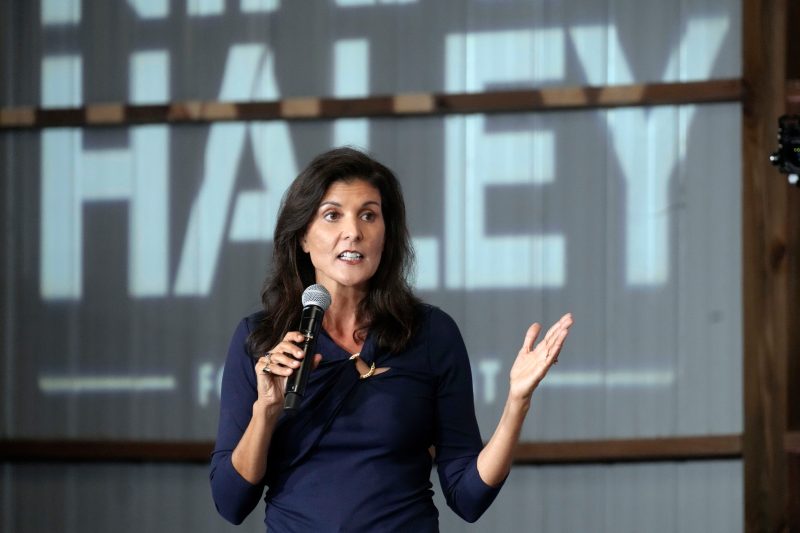Former United Nations ambassador Nikki Haley is seeking to differentiate herself from her GOP presidential rivals on the issue of abortion, stepping forward as a Republican urging her party to grapple now with the political challenge it faces after the Supreme Court overturned Roe v. Wade. Her pitch: Messenger and tone matter.
Haley is set to deliver a speech on abortion Tuesday at the headquarters of Susan B. Anthony Pro-Life America in Northern Virginia, aiming to put her stamp on the issue as an unapologetic antiabortion voice who can nonetheless win back moderate voters who were alienated by other Republican candidates in the 2022 midterm elections. Her speech comes as Republican-led states have moved to restrict abortion access and the courts battle over access to a drug for medication-induced abortions.
The focus of the speech, according to a person briefed on the details, who spoke on the condition of anonymity because they were not authorized to discuss them on the record, will be less about policy details — including the number of weeks in state bans, the exact federal role or the terms of exceptions for rape, incest and life of the mother. Rather, the person said, Haley wants to change the way abortion is discussed, returning to the less aggressive strategy adopted by the antiabortion movement in the late 1990s.
“Republicans won’t win the hearts and minds of Americans unless they’re able to address difficult and personal issues with compassion while sticking to our principles,” Haley campaign communications director Nachama Soloveichik said in a statement. “Nikki Haley is the only presidential candidate who demonstrates an ability to talk about abortion in a way that appeals to the swing voters Republicans need to win the general election.”
“You will never see Donald Trump or Ron DeSantis give a speech like this,” Soloveichik added.
The speech is the latest move by the campaign to distinguish Haley’s pitch from the two leading candidates in polls of the GOP race.
Haley is expected to lean on her own unique perspective, as the only GOP candidate in the race who is a woman and the only person who has given birth, according to the person briefed on the speech. Her husband, Michael Haley, was adopted as a child from foster care.
“In politics, people assume that if you’re Republican you’re pro-life because that’s what the party tells you to be. I’m pro-life because I get the chance to spend every day with my husband, knowing that I am blessed,” Haley said in her keynote address at the SBA List’s 2019 Campaign for Life gala.
Republican strategists have become increasingly vocal in their concerns about the GOP approach to what has long been a core issue. At a speech last week in California, Republican National Committee Chairwoman Ronna McDaniel offered a blunt warning about the need to put Democrats on defense over the issue.
But since the court overturned Roe last year, doing away with the 1973 ruling that had established a constitutional right to abortion, Republicans have largely been trying to play defense. Democrats found success campaigning on abortion in the midterms, touting their support for abortion rights and reminding voters about the decision cemented by the court’s conservative majority. In battleground races and ballot measures last fall, abortion rights advocates won major victories, even in some conservatives states, in a reflection of the energy currently on their side of the issue.
This dynamic has been part of the debate within the Republican presidential primary, where candidates have staked out different positions. Florida Gov. Ron DeSantis, who has made moves toward entering the race, recently signed a ban on abortion after six weeks of pregnancy, a point on the timeline before some even know they are pregnant. A recent Wall Street Journal poll found that a six-week abortion plan is popular with Republicans, but opposed by 53 percent of voters overall and 64 percent of White suburban women.
Sen. Tim Scott (R-S.C.) who has formed a presidential exploratory committee, recently struggled to answer direct questions about how long into a pregnancy he would allow for abortions. Former vice president Mike Pence, who is moving toward his own bid, has tried to position himself as one of the strictest opponents of abortion rights, previously expressing support for a federal 15-week ban and calling for an end to the use of mifepristone, the abortion drug caught up in legal battles.
As governor of South Carolina, Haley signed a bill in 2016 banning most abortions at 20 weeks. The bill did not provide exceptions for rape or incest, but did allow an exception to protect the life of the mother. But since launching her campaign for president, Haley has avoided attaching herself to specific policy proposals, calling for the party to come to a consensus on a prospective abortion ban without directly saying how many weeks she believes would be appropriate.
“What we have to do is we have to be very loving in the way we do this, but we also have to figure out that we’ve got to figure this out. So let’s do it,” Haley said in an interview with the Christian Broadcasting Network the day of her campaign launch in February. “They can have the debate on whether that means 15 weeks or 10 weeks or six weeks, but let’s at least start with the fact that we don’t think that abortions up until the time of birth is acceptable.”
Haley is planning to make similar points on Tuesday, according to the person briefed on the details of her speech, with a focus on building consensus and preventing as many abortions as possible by focusing on legislation supported by majorities of Americans. The person said Haley will say she supports some federal role in abortion, but believes states should pursue individual restrictions based upon where how they can find consensus.
A spokesman for Trump’s campaign told The Washington Post last week that the former president feels abortion should be left up to the states. His position has prompted criticism from Pence and SBA Pro-Life America.
Democrats have signaled an awareness of Haley’s efforts to present herself as a different type of Republican on abortion. On the day she announced her campaign, NARAL Pro-Choice America President Mini Timmaraju released a statement pushing back at any attempt to separate herself from others in her party.
“Haley’s views on abortion are just as extreme as others gunning for the Republican nomination,” Timmaraju said.



























